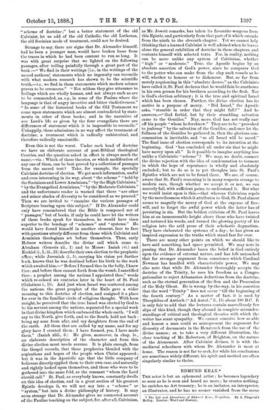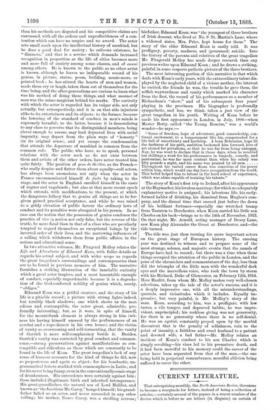EDMUND KEAN.*
THE actor is bat an ephemeral artist ; he becomes legendary so soon as he is seen and heard no more ; he creates nothing, he enriches no Art treasury; he is an imitator, an interpreter, an illustrator, and he has no sooner vanished from the scene
* The Life and Adventures of Edmund Kean, Tragedian. By J, Fitzgerald. Molloy. London: Ward and Downey.
than his methods are disputed and his competitive claims are canvassed, with all the ardour and unprofitableness of a con- tention which can have no umpire and no award. The actor sets small mark upon the intellectual history of mankind, but he does a good deal for society ; he enlivens existence, he "distracts," and that is a service which demands increased recognition in proportion as the life of cities becomes more and more full of anxiety among some classes, and of ennui among others. He is known to the public as no other artist is known, although he leaves no indisputable record of his genius, in picture, statue, poem, building, music-score, or printed book ; he has stirred the hearts of men and women, made them cry or laugh, taken them out of themselves for the time being, and the after-generations are curious to learn what was his method of doing these things, and what manner of man was the mime-magician behind his masks. The curiosity with which the actor is regarded has its vulgar side, not only actually, but retrospectively, and it is on that side injurious alike to its entertainers and its objects : to the former, because the lowering of the standard of conduct in men's minds is supremely harmful ; to the latter, because it is demoralising to any class to perceive that its distinguished members, being clever enough to amuse, may lead depraved lives with social impunity, may depart from the plain ways of " honesty " (in its original sense), and yet escape the condemnation that attends the departure of mankind in common from the common rule. The public, who have, so to speak, personal relations with the actor such as do not exist between them and artists of the other orders, have never treated him quite fairly. The position of gens de theatre, as the French— who really despise and flatter them about equally—call actors, has always been anomalous, not only when the actor in France excommunicated himself de facto by taking to the stage, and the actor in England enrolled himself in the caste of rogues and vagabonds ; but also at that more recent epoch which extends, with modifications, to the present, at which the dangerous fallacy that to genius all things are to be for- given gained practical acceptance, and while he was raised to a giddy elevation of public favour the ordinary laws of conduct and its penalties were abrogated in his person. In no case can the notion that the possession of genius condones the practice of vice (a notion not only false, but the reverse of the truth), be more fatal than in that of a class who are peculiarly tempted to regard themselves as exceptional beings by the inverted order of their lives, and the narrowing influences of a calling which withdraws them from public affairs, in the serious and educational sense.
In two attractive volumes, Mr. Fitzgeral Molloy relates the Life and Adventures of Edmund Kean, with fuller details as regards his actual subject, and with wider scope as regards the great tragedian's surroundings and contemporaries than are to be found in previous memoirs of him. The narrative furnishes a striking illustration of the insatiable curiosity which a great actor inspires, and a most lamentable example of conduct, especially unpardonable because it is a degrada- tion of the God-conferred nobility of genius which, surely, "obliges."
Edmund Kean was a pitiful creature, and the story of his life is a pitiable record ; a picture with strong lights indeed, but terribly black shadows ; one which shows us the man odious and contemptible, the actor great, admirable, pro- foundly interesting ; but, as it were, in spite of himself, for the mountebank element is always strong in him (wit- ness his having himself amused by the performances of an acrobat and a rope-dancer in his own house), and the victim of vanity so overweening and self-tormenting, that the vanity of Garrick is mere self-complacency beside it. Besides, Garrick's vanity was corrected by good conduct and common- sense,—strong preservatives against manifestations so con- temptible and ridiculous as those which are constantly to be found in the life of Kean. The great tragedian's lack of any sense of humour accounts for the kind of things he did, now so preposterous and again so abject ; for his bombastic, un- grammatical letters studded with commonplaces in Latin ; and for his never being funny, even in the conventionallycomic stage of drunkenness. His antecedents were certainly against him ; these included illegitimate birth and inherited intemperance. His great-grandfather, the natural son of Lord Halifax, and known as "the facetious Mr. Carey," hanged himself; his grand- father failed as an actor, and never succeeded in any other calling ; his mother, Nance Carey, was a strolling actress; his father, Edmund Kean, was "the youngest of three brothers of Irish descent, who lived at No. 9 St. Martin's Lane, where a widowed sister, Mrs. Price, kept house for them." The story of the elder Edmund Kean is easily told. It was profligacy, poverty, madness, and (presumed) suicide. Into the history of the parents and relatives of the great tragedian Mr. Fitzgerald Molloy has made deeper research than any previous writer upon Edmund Kean ; and he draws a striking, painful, in some respects pathetic picture of the three brothers. The most interesting portion of this narrative is that which deals with Kean's early years, with the extraordinary talent dis- played by the neglected child of a vicious mother, the interest he excited, the friends he won, the trouble he gave them, the selfish waywardness and vanity which marked his character from the first, the record of his performances as a member of Richardson's "show," and of his subsequent four years' playing in the provinces. His biographer is profoundly sympathetic, and has, we think, taken a just view of the great tragedian in his youth. Writing of Kean before he made his first appearance in London, in July, 1806—when Master Betty, called "the Young Roscius," was a world's wonder—he says :—
"Sense of freedom, hope of adventure, good comradeship, con- tinual excitement, to a temperament like his, compensated for a life full of uncertainty and hardship. A born Bohemian, hope lit the darkness of his path, ambition beckoned him forward, love of art atoned for privations, so that he was far from being unhappy Nay, he was wont to declare that in those days, when he received ten shillings a week for his performance in tragedy, comedy, and pantomime, he was far more content than when his sainry was fifty pounds a night, and his name was praised by all men Throughout his varied career Kean was conscious of the power within him, which would one day force recognition from the world. This belief helped him to labour in the hard school of experience, which was alone capable of training his talents."
The story of Kean's first trip to Ireland, 'after his appearance at the Haymarket, his loveless marriage (for which no adequately explanatory motive is assigned), his laborious life, his early- formed habits of drinking, his dismissal from Hughes's com- pany, and the dismal time that ensued just before the dawn
of his brilliant fortunes—especially one wretched tramp from Taunton to Dorchester, when Kean carried his little son
Charles on his back---brings us to the 14th of November, 1813. On that night, Mr. Arnold, acting manager of Drury Lane, saw Kean play Alexander the Great at Dorchester, and—the tide turned.
The tide was just then turning for more important actors on the great stage of European history. The ensuing year was destined to witness and to prepare some of the
most strange, solemn, and majestic events that the annals of Europe have had to record ; but there was a time when these things occupied the attention of the public in London, and the pens of the chroniclers and commentators of the day, less than did the triumphs of the little man with the wonderful dark eyes and the marvellous voice, who took the town by storm. with his Richard, Duke of Gloucester, on February 12th, 1814.
Here Hazlitt, from whom Mr. Molloy makes very well-chosen selections, takes up the tale of the actor's success, and it is a deeply impressive one, with all the misunderstandings,
quarrels, and vicissitudes which it includes. Equally im- pressive, but very painful, is Mr. Molloy's story of the man. Kean, according to him, was a profligate, with low tastes, a vile temper, and depraved habits; he was impro-
vident, unprincipled; his reckless giving was not generosity, for there is no generosity where there is no self-denial. He was an egotist, constantly preyed upon by the morbid discontent that is the penalty of selfishness, vain to the point of insanity, a faithless and cruel husband to a patient and devoted wife, a bad father—Mr. Molloy relates an incident of Kean's conduct to his son Charles which is simply revolting—his vices led to his premature death, and it had been merciful to his memory could the career of the actor have been separated from that of the man,—the one being held in perpetual remembrance, merciful oblivion being suffered to cover the other.



















































 Previous page
Previous page